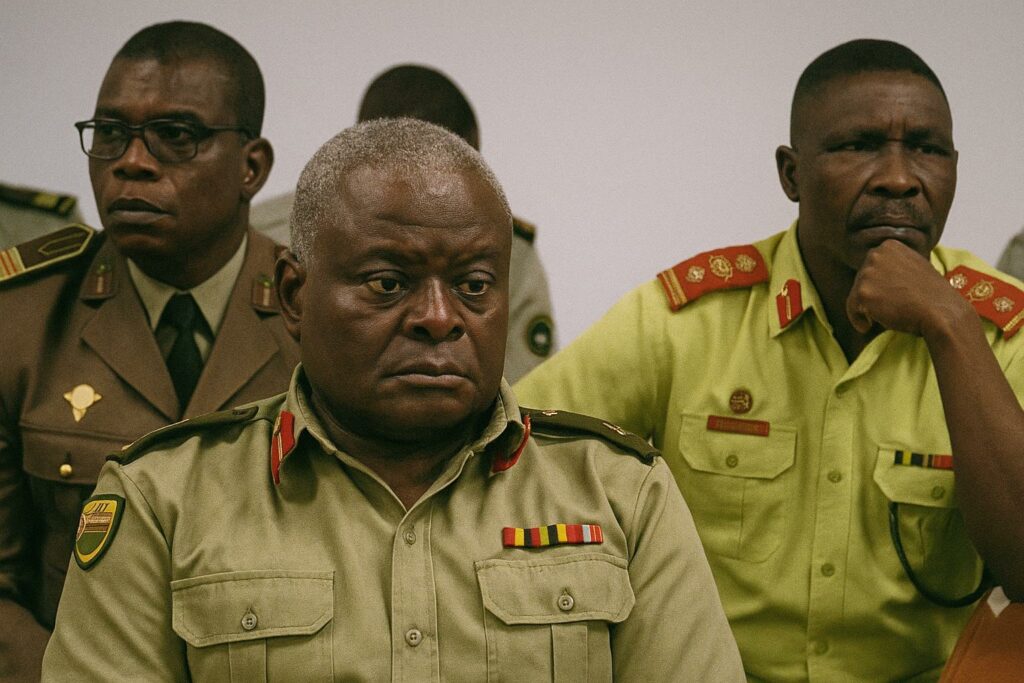A geographically landlocked nation looks to the sea
When the National Defence University of Zimbabwe (NDUZ) unveiled its new Centre for Maritime Strategy late last month, sceptics were quick to point out the obvious: Zimbabwe has no coastline. Yet, in a region where over 90 percent of external trade moves by sea, even a land-locked state cannot afford strategic myopia. According to Vice-Chancellor Air Vice-Marshal Michael Tedzani Moyo, Harare’s decision to court expertise from the Democratic Republic of Congo (DRC) stems from a sober reading of Southern Africa’s economic map. The Beira and Durban corridors that feed Zimbabwean commerce are increasingly vulnerable to piracy, illegal fishing and narcotics trafficking, all threats that the DRC Navy has confronted in the Atlantic approaches to Matadi and within the Gulf of Guinea.
Congolese instructors bring riverine and littoral lessons
The visiting faculty, led by Rear Admiral Jean-Marie Valentin Bandoma, is hardly new to asymmetrical maritime challenges. Over the past decade Kinshasa has modernised riverine patrols along the Congo River and has cooperated with Angola in curbing smuggling around the oil-rich enclave of Cabinda (International Crisis Group, 2022). Zimbabwean cadets enrolled in the inaugural cohort are therefore exposed to case studies ranging from boarding protocols on fast-moving pirogues to the use of unmanned aerial systems for estuary surveillance. Admiral Bandoma notes that while the DRC’s Atlantic frontage measures a modest 37 kilometres, “our operational theatre extends hundreds of miles inland where insurgents use the river as a logistical highway,” a complexity that resonates with SADC’s broader fight against transnational extremism in northern Mozambique.
SADC’s collective security doctrine gains academic traction
Harare’s initiative dovetails with the Southern African Development Community Integrated Maritime Security Strategy adopted in 2019, which urges member states, coastal or not, to develop interoperable doctrines. The Zimbabwean defence ministry acknowledges that such intellectual integration lags behind tactical exercises like Operation Künene and the annual Obangame Express, where Congolese and South African frigates routinely drill boarding manoeuvres (African Union Maritime Security Report, 2023). Embedding Congolese curricula inside NDUZ therefore positions Zimbabwe to contribute qualified staff officers to the SADC Maritime Coordination Cell in Maputo, a post previously reserved for navies with blue-water credentials.
Economic arteries and political optics
Beyond doctrinal synergy, Harare’s pivot towards maritime studies conveys a pragmatic economic signal. Roughly 70 percent of Zimbabwe’s petroleum imports and 60 percent of its tobacco exports transit through the Mozambican port of Beira (World Bank Logistics Performance Index, 2022). A single disruptive incident in the Mozambique Channel could reverberate across Zimbabwean fuel pumps within days. Aligning with Congolese know-how, moreover, helps President Emmerson Mnangagwa showcase regional solidarity at a moment when Western partners remain lukewarm toward his governance reforms. Speaking on the sidelines of the handover ceremony, Foreign Minister Frederick Shava stressed that “security cooperation under SADC auspices is shielded from the conditionalities often attached to extra-regional assistance,” a comment widely interpreted as a subtle rebuke of the United States’ renewed sanctions framework unveiled in March.
DRC’s soft-power dividend
For Kinshasa, exporting maritime pedagogy is equally strategic. President Félix Tshisekedi’s administration has spent political capital championing the so-called ‘DRC as a maritime nation’ narrative to attract port investments in Banana and develop the Congo River economic corridor. By mentoring Zimbabwean officers, the DRC signals that its naval reforms, assisted by the European Union’s EUTM mission and Japanese grant aid for radar stations, have matured sufficiently to be shared (EU External Action Service, 2023). Diplomatic observers argue that such educational outreach also strengthens Kinshasa’s bid for leadership within the SADC Organ on Politics, Defence and Security, a portfolio rotating in August.
Navigating challenges of implementation
Yet enthusiasm must temper expectations. Logistical questions linger over how Zimbabwe will conduct practical sea training without its own coastline. Vice-Chancellor Moyo concedes that cadets will undertake afloat phases aboard Mozambican or South African vessels under a trilateral understanding still being negotiated. Funding is another concern: the Treasury’s 2024 defence allocation rose by only 2 percent in real terms. Analysts at the Harare-based think-tank SAPES Trust warn that without sustained budgetary support the programme risks becoming “a conference-room exercise accompanied by polished PowerPoints but devoid of operational heft.”
Strategic foresight amid shifting tides
Nevertheless, the infusion of Congolese expertise into Zimbabwe’s defence education underscores an emerging recognition that African security frontiers are fluid, transcending cartographic coastlines. In a region where insurgent groups exploit maritime routes as readily as porous land borders, the very concept of ‘land-locked’ is being reimagined. Should Harare and Kinshasa translate academic accord into functional interoperability, SADC could move closer to the elusive goal of a seamless maritime security architecture. The lesson, as one senior Congolese lecturer quipped during a break in lectures, is that “sooner or later every state realises it has a coastline—the only question is how far away it is.”

